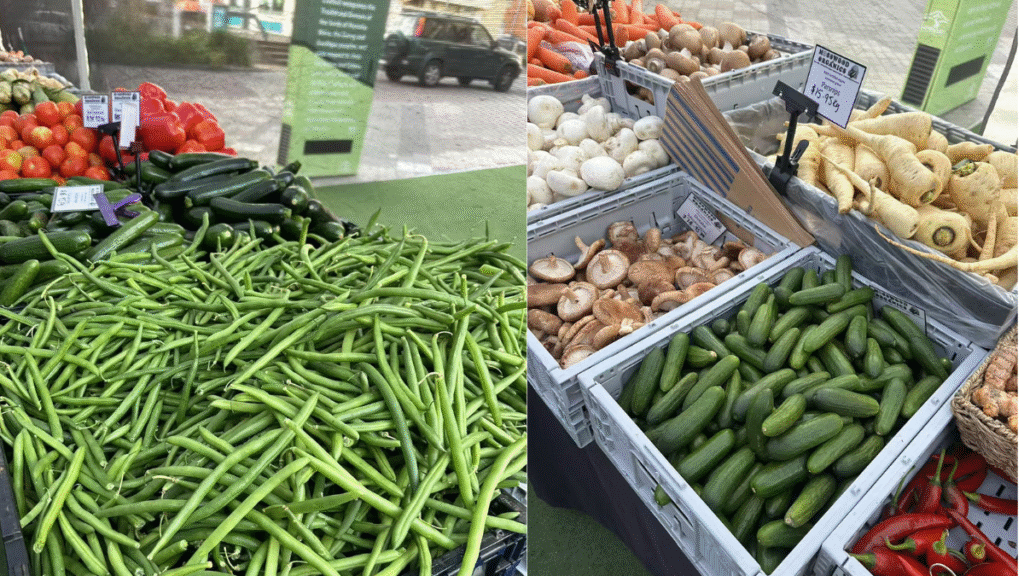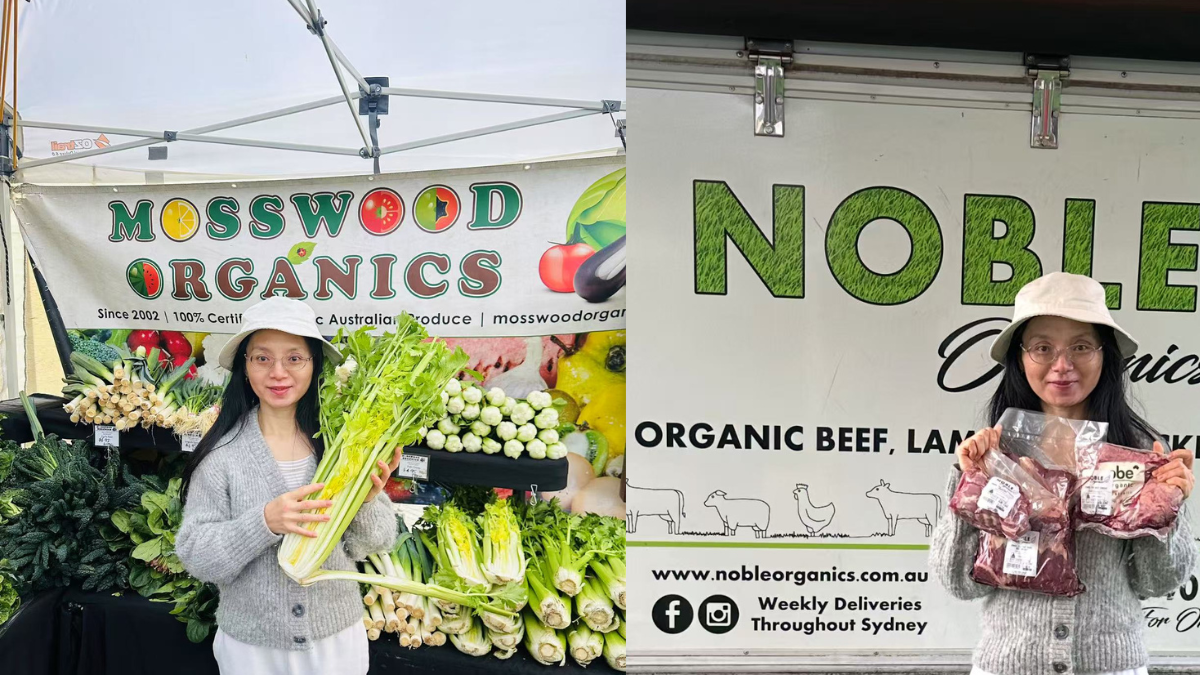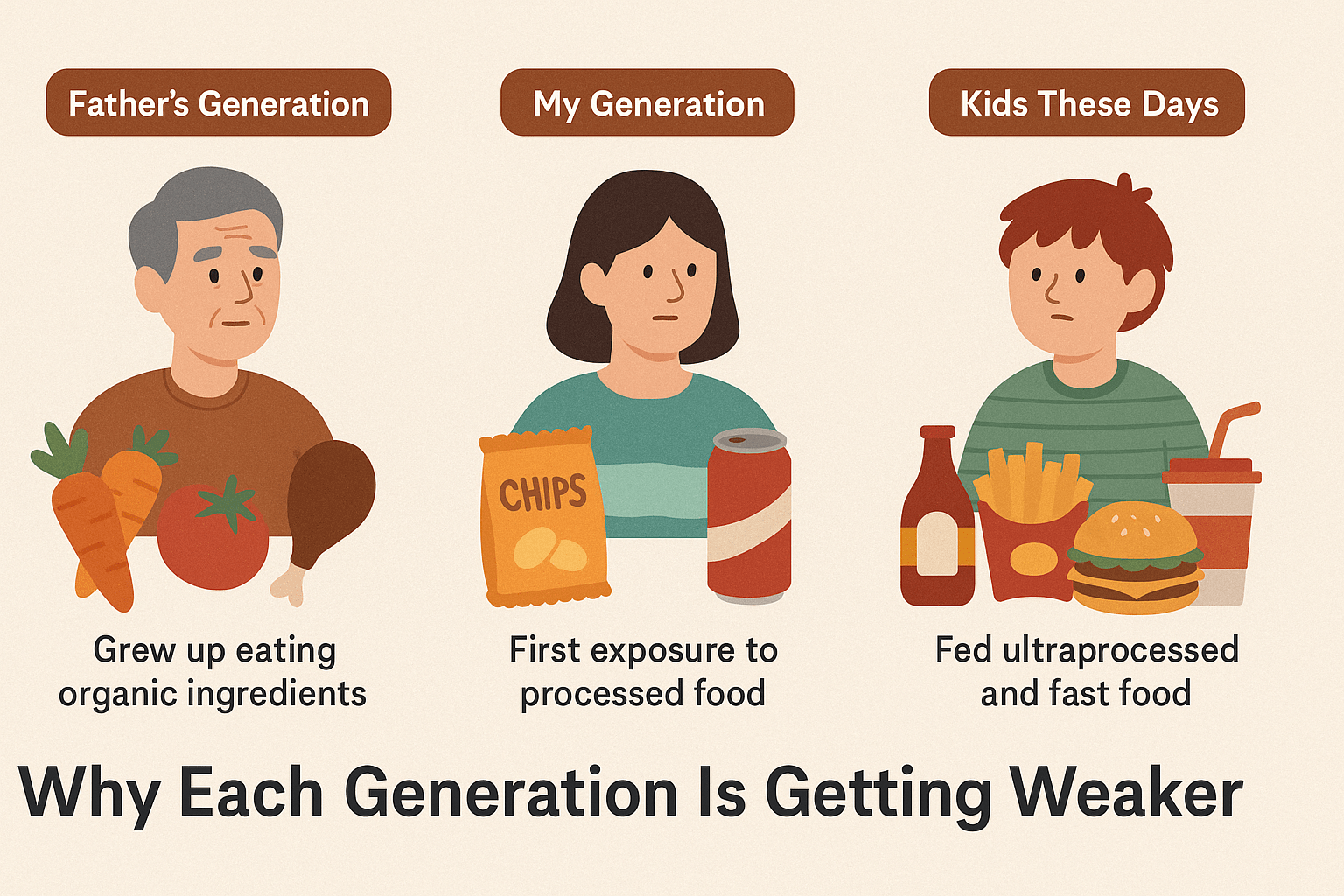Sustainable Swap #1 Why I Choose Organic & Local: 4 Reasons I Shop at Farmers Markets
One of the most impactful swaps I’ve made on my sustainable lifestyle journey is how I buy my food. I used to rely on supermarket shelves — plastic-wrapped veggies, meat from who-knows-where, and produce that somehow never ripened properly but went bad quickly.
Now I buy all my veggies and meat fresh, local, and organic — straight from the farmers market.
Here are 4 reasons why this swap matters — not just for me, but for everyone who wants to live healthier, more consciously, and more sustainably.
🥬 1. Pesticides in Veggies & Hormones in Meat Are a Health Concern
Conventional vegetables are often sprayed with multiple rounds of synthetic pesticides and herbicides. These chemicals leave residues that can’t always be washed off and accumulate in our bodies over time.
According to Environmental Health Perspectives, pesticide exposure has been linked to:
- Hormone disruption
- Reduced fertility
- Increased risk of certain cancers
- Developmental and neurological issues in children
As for meat, most supermarket-sourced meat comes from intensively farmed animals, often fed antibiotics and growth hormones to fatten them quickly. These substances can disrupt the endocrine system in humans and contribute to antibiotic resistance.
👉 A 2021 randomized controlled dietary intervention trial, led by Newcastle University researcher Leonidas Rempelos, found that switching from a conventional to a fully organic diet can reduce pesticide exposure by over 90%.

🥦 2. Supermarket Produce Often Isn’t Fresh
The nutritional value of food begins not at harvest — but with how it’s grown. Industrial agriculture prioritizes high yields over nutrient density. To achieve fast growth and visual perfection, crops are fed with synthetic fertilizers and bred for storage durability. But these practices often strip the soil of essential minerals and reduce the nutrient density of the plants themselves.
📌 A 2024 peer-reviewed article published in Frontiers in Nutrition (PMC10969708) confirms that modern farming practices have caused measurable declines in the mineral content of fruits, vegetables, and grains — primarily due to soil degradation, chemical inputs, and crop breeding focused on appearance and yield over nutrition.
After harvest, produce is often kept in cold storage and transported long distances. Fruits like bananas are picked green and ripened artificially using ethylene gas. While this makes them look ripe, it reduces their natural flavor and vitamin content.
According to the Journal of Agricultural and Food Chemistry, fruits and vegetables begin losing nutrients immediately after harvest, with vitamin C being especially vulnerable to degradation from time, air, and light exposure.
🛒 In contrast, food grown locally — especially by small-scale, organic farmers — is often richer in flavor and nutrients. These foods are picked at peak ripeness, sold quickly, and grown in healthier, mineral-rich soil.
So when you choose local and organic, you’re choosing food that’s been grown better, stored less, and delivers more nourishment.
3. Taste That’s Actually Real
If you’ve ever wondered why tomatoes from the supermarket taste like cardboard — you’re not imagining it.
Conventional produce is bred for uniformity and shelf life, not flavor. The priority is to ensure food survives long-distance shipping and looks visually perfect on the shelf — even if that means sacrificing its natural taste and aroma.
A 2012 study by the University of Florida confirmed this, finding that commercial tomatoes are selectively bred for appearance, but in doing so, they lost key genes responsible for flavor.
I feel this deeply because I grew up in China in the 1980s, when food was still simple, seasonal, and homegrown. My family had our own vegetable garden, and I still remember the joy of picking fresh cucumbers, tomatoes, and leafy greens — the smell, the sweetness, the richness of real food.
But as beautifully packaged food began appearing in supermarkets, that true flavor started disappearing. For years, I searched for that taste — the one I knew as a child.
And it wasn’t until I switched to organic produce that I found it again. The flavor of real food — grown in healthy soil, picked at the right time, and never rushed — transported me straight back to those warm childhood memories in our family garden.
Organic food isn’t just healthier — it’s deeply nostalgic. It connects us to the land, to our roots, and to the authentic flavors many of us have forgotten.
Plus, when food tastes like real food, it actually helps reduce waste — people are more likely to eat and enjoy it. Conversely, food that tastes bad is more easily discarded, contributing to higher food waste globally.
So yes, you can taste the difference — and sometimes, you can even taste your past.
🌏 4. Better for the Environment
Industrial farming practices rely heavily on:
- Pesticides that pollute soil and waterways:
These chemicals not only kill pests but can also harm beneficial insects, disrupt ecosystems, and contaminate groundwater. Over time, pesticide accumulation degrades soil health and reduces biodiversity. - Synthetic fertilizers that contribute to greenhouse gas emissions:
The production and use of synthetic fertilizers release significant amounts of nitrous oxide, a potent greenhouse gas that accelerates climate change. Excess fertilizers can also cause nutrient runoff, leading to harmful algal blooms in waterways. - Long-distance transport that increases carbon footprint:
Food often travels thousands of kilometers from farms to consumers, relying on fossil fuels for transportation and refrigeration. This contributes substantially to carbon emissions associated with the global food system. - Plastic packaging that ends up in landfill:
Single-use plastic packaging used to protect and display produce contributes to growing plastic pollution, much of which is not recycled and harms wildlife and ecosystems.
On the other hand, shopping at farmers markets:
- Supports smaller, regenerative farms:
These farms use practices such as crop rotation, cover cropping, and reduced tillage, which rebuild soil organic matter, improve water retention, and enhance ecosystem resilience. - Reduces food miles:
Buying locally means food travels shorter distances, cutting down on fuel use and emissions linked to transportation and storage. - Cuts out single-use plastic:
Farmers markets often encourage reusable bags and minimal packaging, significantly reducing plastic waste. - Helps restore soil health and biodiversity:
Sustainable farming encourages diverse crop rotations and preserves native plants and beneficial insects, which strengthens the overall health of the farming ecosystem.
According to the FAO (Food and Agriculture Organization), sustainable farming methods like organic and regenerative agriculture play a critical role in combating climate change, preserving biodiversity, and ensuring food security for future generations.
💚 The Real Cost of Food: Why Organic Saves You Money
Choosing organic and local isn’t always seen as the cheapest or easiest option — and for many, the first thought when considering organic food is that it’s too expensive. But in reality, it’s about shifting priorities and making smarter choices that benefit your health, your wallet, and the planet.
When you choose organic, you often naturally cut out processed foods, takeaways, and chemically-laden products — which can actually be more costly over time. Think about the hidden expenses: medical bills, lost productivity, and the toll poor health takes on your quality of life. Investing in real, nutrient-rich food can reduce your risk of chronic illnesses and improve your well-being.
In this way, organic food is an investment in your long-term health and often more economical than many people realize. The money you save on healthcare and wellness far outweighs the slightly higher upfront cost of organic produce.
This is my Sustainable Swap #1, and it’s the foundation of my eco journey. If you haven’t visited a farmers market lately, make it a weekend ritual — your body will thank you, and so will the Earth.




